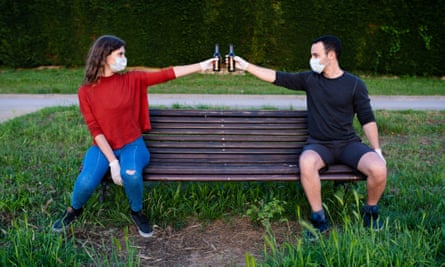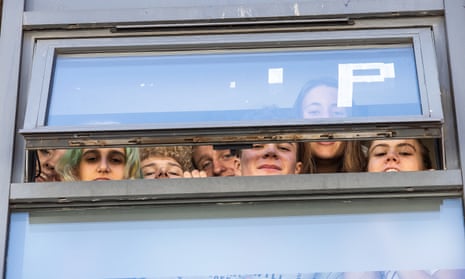I recently came across a folder on my laptop labelled “Covid”. Inside I found screenshots I had taken of the government website, showing daily cases, ICU admissions and deaths from Covid-19. These reports were released every weekday during the first lockdown, and each afternoon I would collect them in this folder and study them, trying to understand what was happening in the wider world – before I began a busy evening of Zoom birthday quizzes, Netflix Party and WhatsApp.
I was shocked – both that I had ever been so macabre in the first place, and also that, four years later, I had forgotten doing it. I don’t remember being anxious or depressed during lockdown, but I have 60 image files suggesting otherwise.
In general, studies since 2020 have displayed a widespread decline in young people’s mental health, often linked to the experience of the pandemic. According to the Royal College of Paediatrics and Child Health, 75% of mental health difficulties start before the age of 24; so young people are more vulnerable, as adolescence involves crucial milestones in emotional and social development. Some experts claim that my generation may have to suffer the consequences of social distancing and cessation of work for the rest of our lives, that on top of economic difficulties we also face a unique experience of social disintegration.
And yet, despite what my folder of screenshots may suggest, I don’t feel too badly affected by the pandemic. I was 21 and studying at university when Covid hit, and was able to move home for my final exams. I was lucky to have a quiet room to myself, with no financial concerns or specific health issues. Those a couple of years younger than me – starting their studies, rather than finishing them – fared worse, continuing a larger stretch of their university period under the doomscape of 2020 and 2021.
A friend, who is now 22, thinks her peers rely more on “internet speak”, having been immersed in social media over Covid, and thus developed the lexicon and mannerisms from TikTok et al without intention. They also are “much less inclined to go out and drink” and don’t know how to behave in front of “new people”. She told me that, in comparison, 25-year-olds have “more real-life personalities”, which we forged away from our smartphones, before the pandemic.

My darkest point was when I got Covid, just before Christmas 2020. I spent the next fortnight alone, trying to recover, not once leaving the house, or taking a shower. On Christmas Day, I watched 10 episodes of Bridgerton just so I wouldn’t have to sit for a second with my own thoughts. I was struggling. But after I recovered, I was grateful for tiny things, like getting to walk on the grass and have dinner with my family. For a few days, I felt simply happy.
Everyone’s experience was different. Some had worse experiences with the virus itself. Some contracted long Covid, or lost a loved one to it. But such things aren’t restricted to one age group. And so the generational lens may be a blunt tool by which to make assessments; it could be damning to label a whole cohort as psychologically and economically scarred. It is perhaps another way of underestimating young people. After all, those who were most affected across all generations were those who were already at risk of unemployment, mental health issues and poverty. All the stats say that Gen Z has been wounded by the pandemic, but many of my peers are more resilient than people may think.
It’s true that I was affected in terms of personal life and employment, especially in my struggle to get a job after university. I also blame Covid-19 for the breakdown of a past relationship. My then-boyfriend and I both did our best to make it work, but in the first lockdown our relationship moved on to WhatsApp, and ultimately it forced us apart. But for all the reports of an entire generation permanently blighted by the pandemic, we didn’t have the same experience across the board. My flatmate, aged 24, is nostalgic about the first lockdown, remembering it as a time of sunshine and spring and finishing his dissertation in peace. Another friend said she grew closer with her sister over that time.
It may be that the people I know had the support network and financial prospects to be able to bounce back. But it wasn’t just the lucky ones among us who, looking back now, can see the positives of the pandemic. My friend was living with his elderly father and his brother, who had mental health difficulties at the time. He says it was a “very stressful” time – and yet also “character-building”. During the pandemic he had to be extremely careful about public transport, walking across London instead of taking the tube, even if it took hours.
The subsequent alleviation of risk after the vaccine offered a perspective shift, which had a positive, long-lasting effect on his mental health; he had the realisation of “everything’s fragility”, which he says has helped him. The studies that back this up are in the minority, but they do exist, for example, a systematic review by the BMJ suggests that Covid has had little significant impact on mental health across the population, including in young people. One study from Italy goes even further, reporting that 14- to 20-year-olds had more time for self-discovery and personal growth.
But it’s telling that most of my friends seem to have decided not to mention the pandemic again. For me, that is sufficient proof that it did do some damage. My friends and I don’t reminisce about shared experiences from this time because we don’t have any; it feels like a hole in time. Even the positive reflections are couched in conflicted terms, or apologetic for seeing the good in a traumatic experience. Covid-19 might have stolen a chunk of our adolescence but my peersseem keen to make the best of a bad situation, and a lot of them talk of going through a “second youth” now.
Isabel Brooks is a freelance writer










